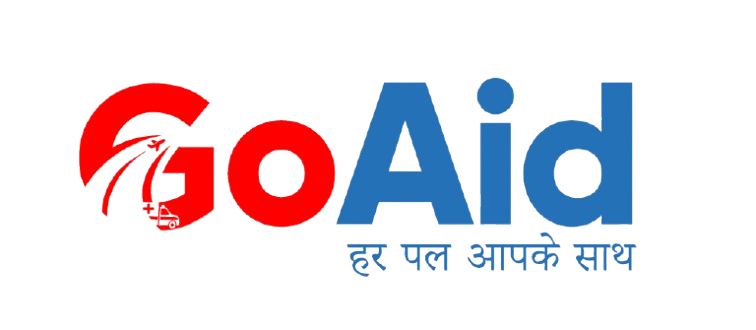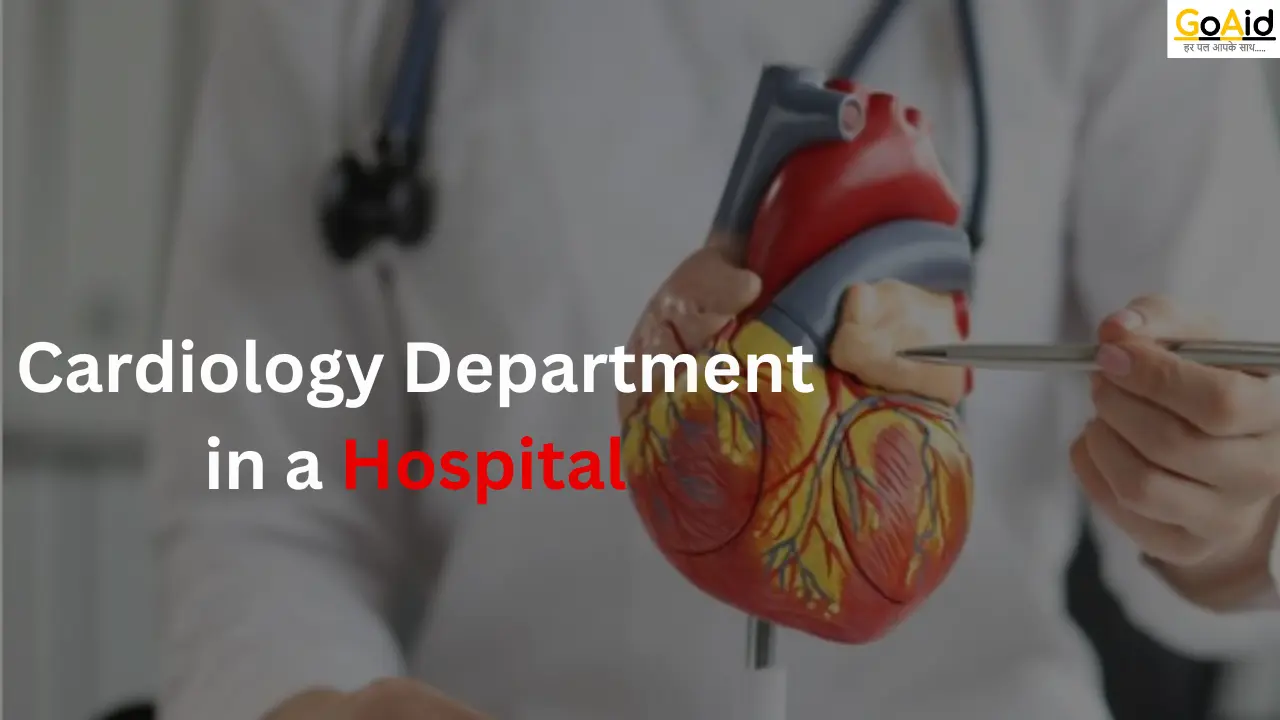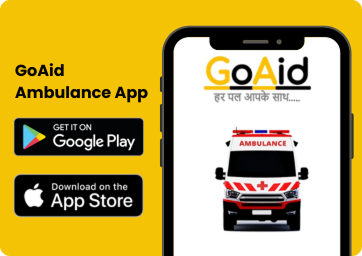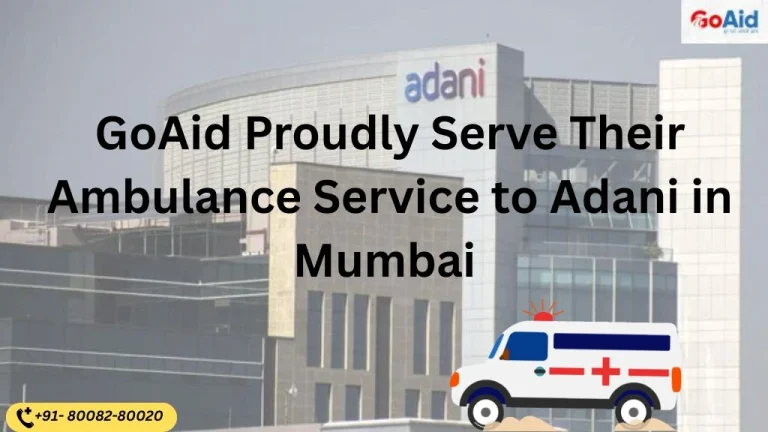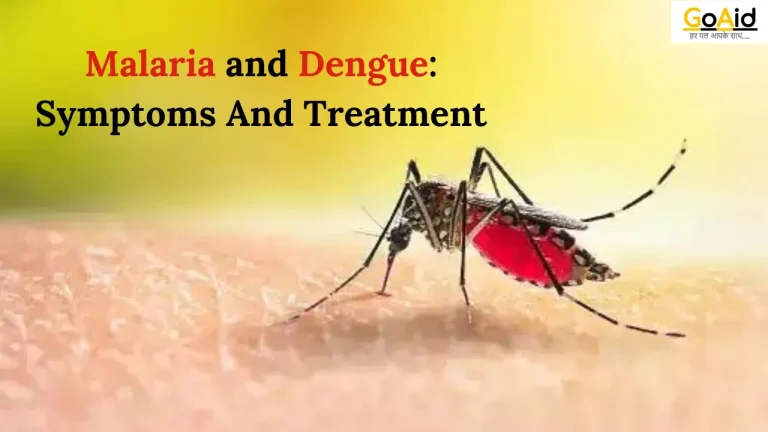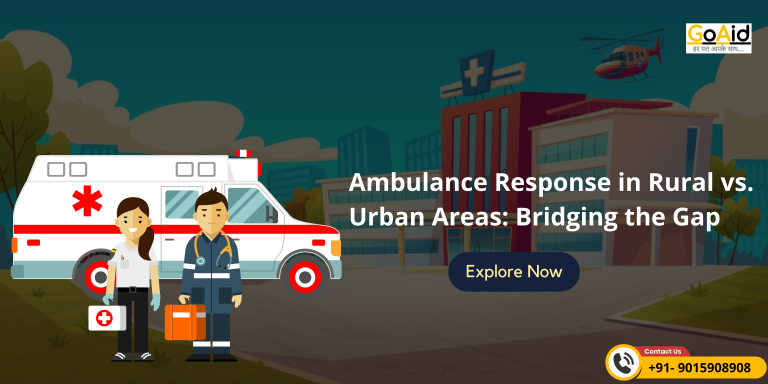In India, there are so many people are affected by cardiovascular diseases. And because of that, most of them usually visit the Cardiology Department of their nearby hospitals. This is why, knowing about the Cardiology Department in a Hospital is crucial even if you are not affected or negatively impacted by Cardiovascular Diseases because no one knows when you need it. Also, getting all the information about the Cardiology Department in a Hospital is very hard stuff to find.
This is why, in this blog, we have added all the details about the ŌĆśCardiology Department in a HospitalŌĆÖ. Not only that, we have explained every component of the Cardiology Department in a Hospital with all the required information. If you are also excited to know all the details about the Cardiology Department in a Hospital, then read this blog to the end.
So, letŌĆÖs start-
Comprehensive details about the Cardiology Department in a Hospital
These are all the details about the Cardiology Department in a Hospital:
What is the Cardiology Department?
A Cardiology Department is a specialized unit within a hospital dedicated to the diagnosis, treatment, and prevention of heart-related conditions. It houses advanced medical technology and expert cardiology doctors who manage cardiovascular diseases such as heart attacks, arrhythmias, and coronary artery disease. c
The cardiology department in a hospital offers a range of services, including heart cardiology consultations, diagnostic tests like ECG, and treatments like angioplasty. Patients benefit from comprehensive care, making it crucial for maintaining heart health. For those wondering, “What is cardiology,” itŌĆÖs the branch of medicine focused on heart health, handled by cardiologists.
Role of Cardiology Department in a Hospital
These are the major roles of the Cardiology Department in a Hospital:
1. Diagnosis of Heart Conditions
The cardiology department conducts advanced diagnostic tests like ECGs, echocardiograms, and stress tests to detect heart problems and monitor cardiovascular health accurately.
2. Treatment of Cardiovascular Diseases
Cardiology doctors provide medical and surgical treatments for heart conditions, including heart attacks, arrhythmias, and coronary artery disease, ensuring patient-specific care plans.
3. Heart Health Education
The hospital cardiology department educates patients about risk factors, lifestyle changes, and medications to prevent heart diseases, promoting long-term heart cardiology care.
4. Emergency Cardiac Care
Cardiologists handle heart emergencies like heart attacks, providing life-saving interventions such as angioplasty and thrombolysis within the hospital for cardiology.
5. Invasive and Non-Invasive Procedures
The department offers both invasive (stent placement, angioplasty) and non-invasive treatments (medications, lifestyle management) to treat various cardiovascular diseases.
Also Read: Top 10 Hospitals in Delhi | Updated List 2024
6. Post-Surgical Cardiac Rehabilitation
After heart surgery or procedures, the cardiology department in a hospital provides rehabilitation programs to help patients recover and regain strength under expert care.
7. Long-Term Management of Heart Diseases
Cardiologists monitor patients with chronic heart conditions, adjusting treatments as necessary to manage ongoing cardiovascular diseases effectively.
8. Collaboration with Other Departments
The hospital cardiology department works closely with emergency, radiology, and ICU teams for comprehensive cardiac care, ensuring prompt diagnosis and treatment.
9. Innovative Heart Treatment
The department incorporates the latest technology, including robotic surgery and AI diagnostics, to improve outcomes in heart cardiology care.
10. Research and Clinical Trials
Many hospital cardiology departments engage in cutting-edge cardiovascular research and clinical trials to develop innovative treatments and improve heart disease outcomes.
Read More: Full Details about the Emergency Department
Types of Cardiology Department in a Hospital
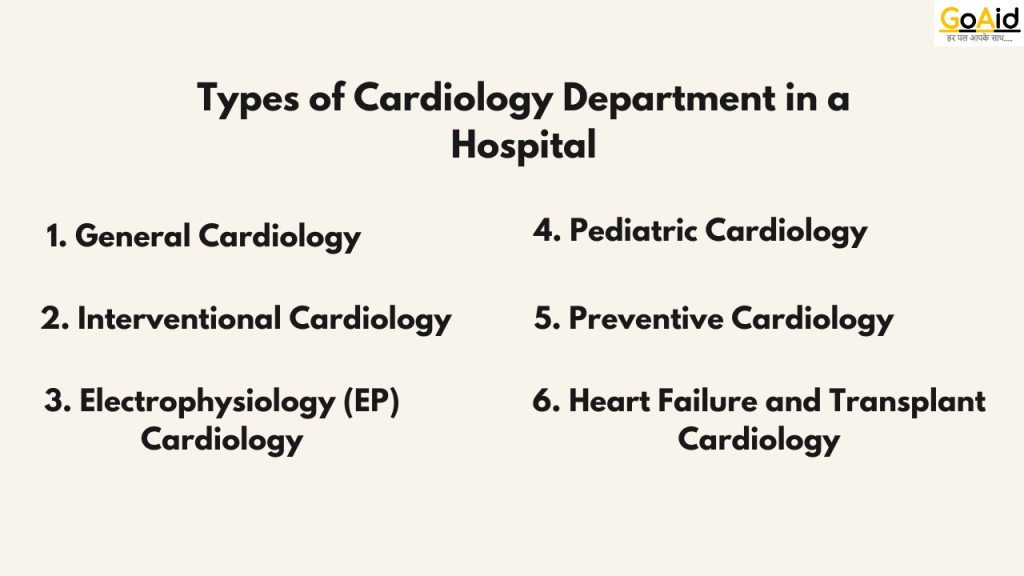
There are mainly 6 types of Cardiology Departments that can generally be found in any hospital:
1. General Cardiology
Focuses on diagnosing and managing common heart conditions like coronary artery disease, hypertension, and heart failure. This department provides routine check-ups, preventive care, and non-invasive treatments.
Key Functions & Responsibilities of this Cardiology Department:-
- Diagnosis of common heart conditions
- Routine heart health monitoring
- Prescribing medications
- Lifestyle and dietary counseling
- Managing chronic heart diseases
Specialties of this Cardiology Department:-
- Hypertension management
- Heart failure treatment
2. Interventional Cardiology
Specializes in catheter-based treatments for heart diseases, avoiding the need for open-heart surgery. It deals with procedures like angioplasty and stent placements.
Key Functions & Responsibilities of this Cardiology Department:-
- Performing angioplasty
- Stent placement in blocked arteries
- Treating coronary artery disease
- Managing heart attack interventions
- Catheter-based diagnostics
Specialties of this Cardiology Department:-
- Angioplasty
- Coronary stent placement
3. Electrophysiology (EP) Cardiology
This department focuses on diagnosing and treating heart rhythm disorders (arrhythmias) using advanced techniques such as pacemaker implantation and cardiac ablations.
Key Functions & Responsibilities of this Cardiology Department:-
- Diagnosing arrhythmias
- Performing cardiac ablations
- Implanting pacemakers and defibrillators
- Managing atrial fibrillation
- Electrical activity monitoring
Know More: The Comparison Between Ambulance Services in Hyderabad ŌĆō GoAid Vs. Others
Specialties of this Cardiology Department:-
- Pacemaker implantation
- Cardiac ablation
4. Pediatric Cardiology
Dedicated to treating heart conditions in children, from congenital defects to acquired heart diseases. This department provides specialized care for pediatric patients.
Key Functions & Responsibilities of this Cardiology Department:-
- Diagnosing congenital heart defects
- Performing pediatric heart surgeries
- Managing congenital arrhythmias
- Monitoring pediatric heart growth
- Providing long-term care for children with heart conditions
Specialties of this Cardiology Department:-
- Congenital heart defect surgery
- Pediatric arrhythmia treatment
5. Preventive Cardiology
Focused on preventing heart disease through lifestyle modification, risk assessment, and early diagnosis. It emphasizes reducing the risk of heart attacks and other cardiovascular events.
Key Functions & Responsibilities of this Cardiology Department:-
- Assessing cardiovascular risk factors
- Providing lifestyle counseling
- Developing exercise and diet plans
- Monitoring cholesterol and blood pressure
- Prescribing preventive medications
Specialties of this Cardiology Department:-
- Risk factor management
- Heart disease prevention strategies
6. Heart Failure and Transplant Cardiology
This department deals with advanced heart failure management and heart transplants. It provides end-stage heart disease treatments and care for transplant patients.
Key Functions & Responsibilities of this Cardiology Department:-
- Managing advanced heart failure
- Pre- and post-heart transplant care
- Monitoring heart function post-surgery
- Coordinating transplant evaluations
- Offering long-term care for heart transplant patients
Specialties of this Cardiology Department:-
- Heart transplant surgery
- Ventricular assist devices (VADs)
Also Read: Hospital Department List: Everything You Need to Know
Common Cardiovascular Diseases Treated in the Cardiology Department
These are the most common diseases that get treated in the Cardiology Department of a Hospital.
1. Coronary Artery Disease (CAD)
CAD occurs when the coronary arteries become narrowed or blocked, reducing blood flow to the heart. This can lead to chest pain (angina) or heart attacks.
Symptoms:-
- Chest pain
- Shortness of breath
- Fatigue
Treatments:-
- Medications (statins, blood thinners)
- Angioplasty and stent placement
- Coronary artery bypass grafting (CABG)
2. Heart Failure
Heart failure happens when the heart is unable to pump blood efficiently, leading to a buildup of fluid in the body and organs. It can be chronic or acute.
Symptoms:-
- Swelling in legs and ankles
- Shortness of breath
- Fatigue
Treatments:-
- Medications (ACE inhibitors, diuretics)
- Lifestyle changes
- Heart transplant (for advanced cases)
3. Arrhythmias
Arrhythmias are irregular heartbeats caused by electrical malfunctions in the heart. These can range from harmless to life-threatening, such as atrial fibrillation or ventricular tachycardia.
Symptoms:-
- Palpitations
- Dizziness
- Fainting
Treatments:-
- Medications (beta-blockers, antiarrhythmics)
- Cardiac ablation
- Pacemaker or defibrillator implantation
Know More: Steps India Is Taking to Ensure the Safety of Women | Explained
4. Hypertension (High Blood Pressure)
Hypertension is consistently high blood pressure that increases the risk of stroke, heart attack, and other cardiovascular issues.
Symptoms:-
- Often asymptomatic
- Headaches
- Shortness of breath
Treatments:-
- Medications (ACE inhibitors, calcium channel blockers)
- Lifestyle modifications
- Regular monitoring
5. Cardiomyopathy
Cardiomyopathy is a disease of the heart muscle that makes it harder for the heart to pump blood. It can lead to heart failure if untreated.
Symptoms:-
- Fatigue
- Shortness of breath
- Swelling in the legs
Treatments:-
- Medications (beta-blockers, diuretics)
- Heart transplant in severe cases
- Implantable devices (ICDs, pacemakers)
6. Atherosclerosis
Atherosclerosis is the buildup of plaque in the arteries, which can restrict blood flow and lead to heart attacks or strokes.
Symptoms:-
- Chest pain
- Weakness
- Numbness
Treatments:-
- Lifestyle changes (diet, exercise)
- Medications (cholesterol-lowering drugs)
- Surgical interventions (angioplasty)
7. Valvular Heart Disease
This condition involves damage to one or more of the heart’s valves, affecting the flow of blood within the heart. It can lead to regurgitation or stenosis.
Symptoms:-
- Shortness of breath
- Chest discomfort
- Fatigue
Treatments:-
- Valve repair or replacement surgery
- Medications to manage symptoms
- Balloon valvuloplasty
8. Pericarditis
Pericarditis is inflammation of the pericardium (the sac surrounding the heart), which can cause sharp chest pain and may lead to complications like fluid buildup.
Symptoms:-
- Sharp chest pain
- Fever
- Shortness of breath
Treatments:-
- Anti-inflammatory medications
- Pericardiocentesis (fluid drainage)
- Surgery in severe cases
9. Congenital Heart Disease
Congenital heart disease refers to structural defects in the heart present at birth, affecting how the heart works. Common defects include septal defects or valve abnormalities.
Symptoms:-
- Bluish skin color
- Rapid breathing
- Fatigue
Treatments:-
- Surgical repair
- Medications
- Monitoring and follow-up care
10. Myocardial Infarction (Heart Attack)
A heart attack occurs when blood flow to a part of the heart is blocked for an extended period, damaging the heart muscle.
Symptoms:-
- Severe chest pain
- Sweating
- Nausea
Treatments:-
- Medications (thrombolytics, blood thinners)
- Angioplasty and stenting
- Coronary artery bypass surgery
Read More: Free Ambulance Service for Pregnant Women in India
Invasive and Non-Invasive Cardiology Treatments
We have explained both invasive and non-invasive Cardiology Treatment briefly below:
What is Invasive Cardiology Treatment?
Invasive cardiology involves procedures that require entering the body to diagnose or treat heart conditions. These procedures often use catheters or surgical interventions to access the heart and blood vessels directly, providing more precise treatment for serious cardiovascular issues.
Key Components:
- Cardiac catheterization
- Angioplasty and stenting
- Coronary artery bypass grafting (CABG)
- Implantation of pacemakers or defibrillators
- Heart valve repair or replacement
Diseases Treated in Invasive Cardiology Treatment:
- Coronary artery disease
- Heart valve disorders
- Congenital heart defects
- Arrhythmias (abnormal heart rhythms)
- Myocardial infarction (heart attack)
What is Non-Invasive Cardiology Treatment?
Non-invasive cardiology refers to diagnostic tests and treatments that donŌĆÖt require inserting instruments into the body. These methods help assess heart function, detect cardiovascular issues, and manage heart conditions without surgery.
Key Components:
- Electrocardiogram (ECG)
- Echocardiography
- Stress testing
- Cardiac MRI
- Holter monitoring
Diseases Treated in Non-Invasive Cardiology Treatment:
- Hypertension (high blood pressure)
- Coronary artery disease
- Heart failure
- Arrhythmias
- Cardiomyopathy
Know More: 7 Common Challenges Faced in Dead Body Ambulance Service
Diagnostic Tests in the Cardiology Department in a Hospital
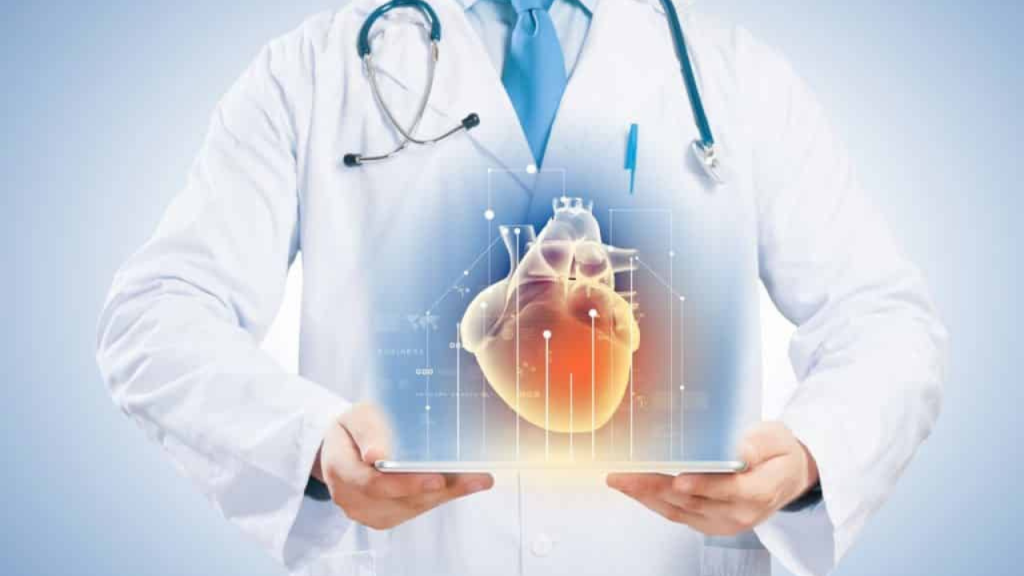
These are some of the main Diagnostic Tests in the Cardiology Department in a Hospital.
1. Electrocardiogram (ECG)
About the ECG test:
An Electrocardiogram records the electrical activity of the heart over a short period. It helps detect irregular heartbeats, heart attacks, and other cardiac abnormalities. ECG is non-invasive and often used as a preliminary diagnostic tool.
Key Components of the ECG Test:
- Electrodes placed on the chest, arms, and legs
- Electrical signals captured on a monitor
- Quick, painless procedure
- Identifies arrhythmias and ischemic heart conditions
- This can be done at rest or during exercise (stress ECG)
2. Echocardiogram
About the Echocardiogram test:
An echocardiogram uses ultrasound waves to create images of the heart. It shows the heart’s structure, movement, and blood flow, helping diagnose issues such as heart valve diseases and cardiomyopathies.
Key Components of the Echocardiogram Test:
- High-frequency sound waves
- Visualization of heart chambers and valves
- Doppler ultrasound for blood flow analysis
- Non-invasive and safe
- Detects heart enlargement or weakened pumping
3. Stress Test
About the Stress Test:
A stress test measures how the heart functions under physical stress, usually performed on a treadmill or stationary bike. It helps evaluate heart performance during exertion and is commonly used to detect coronary artery disease.
Key Components of the Stress Test:
- Physical exercise (treadmill or bike)
- Continuous ECG monitoring
- Blood pressure measurement
- Oxygen level monitoring
- Detects ischemia and heart rate abnormalities
4. Cardiac Catheterization
About the Cardiac Catheterization Test:
This invasive test involves inserting a catheter into the heart through blood vessels to examine heart function and diagnose coronary artery disease. It allows for both diagnostic and interventional procedures like angioplasty.
Key Components of the Cardiac Catheterization Test:
- Catheter insertion into the heart
- Contrast dye for visualization
- X-ray imaging (angiography)
- Measures blood flow and pressure in arteries
- Can be used to perform angioplasty and stenting
5. Holter Monitoring
About the Holter Monitoring Test:
Holter monitoring continuously records heart rhythms over 24-48 hours, providing insight into intermittent heart arrhythmias that might not appear during a standard ECG. It helps in long-term heart rhythm monitoring.
Key Components of the Holter Monitoring Test:
- Portable ECG device worn for 24-48 hours
- Continuous heart rhythm recording
- Non-invasive and comfortable
- Identifies irregular heartbeats over time
- Patients keep a diary of activities and symptoms
6. Cardiac MRI
About the Cardiac MRI Test:
Cardiac MRI uses magnetic fields and radio waves to create detailed images of the heartŌĆÖs structure and function. It provides precise imaging of heart muscles, valves, and blood vessels, helping diagnose complex heart conditions.
Key Components of the Cardiac MRI Test:
- Strong magnetic fields and radiofrequency pulses
- Detailed imaging of heart tissues
- Non-invasive procedure
- Detects heart muscle damage, tumors, and congenital defects
- Safe, with no radiation exposure
7. CT Coronary Angiography
About the CT Coronary Angiography Test:
CT coronary angiography uses a CT scanner to visualize the coronary arteries and detect blockages or plaques. This non-invasive test helps diagnose coronary artery disease and assess the risks of heart attack.
Key Components of the CT Coronary Angiography Test:
- High-resolution CT imaging
- Use of contrast dye to highlight arteries
- Non-invasive, quick procedure
- Assesses blockages in coronary arteries
- Detects calcifications and atherosclerosis
8. Blood Tests (Cardiac Biomarkers)
About the Blood Tests (Cardiac Biomarkers):
Blood tests measure substances released into the bloodstream when the heart is damaged or stressed, such as troponin, BNP, and creatine kinase. These markers help diagnose heart attacks and heart failure.
Key Components of the Blood Tests:
- Troponin levels (indicate heart muscle damage)
- BNP levels (assess heart failure severity)
- Creatine kinase (CK-MB)
- Lipid profile (cholesterol levels)
- C-reactive protein (inflammation marker)
Know More: The Ambulances in India ŌĆō Types and Uses
Key Cardiology Doctors Available in the Cardiology Department & Their Job
These are the key cardiology doctors that can be seen in any cardiology department in a hospital & we also have highlighted their jobs with:
1. Interventional Cardiologist
An interventional cardiologist specializes in catheter-based procedures to diagnose and treat heart diseases. They play a critical role in managing conditions like coronary artery disease and arrhythmias through minimally invasive techniques.
Roles & Responsibilities of Interventional Cardiologist:
- Perform angioplasty and stent placements
- Conduct cardiac catheterizations
- Treat heart attack patients
- Manage peripheral artery disease
- Collaborate with other specialists for comprehensive care
- Monitor post-procedure recovery
- Educate patients about heart health
2. Electrophysiologist
An electrophysiologist focuses on diagnosing and treating electrical problems of the heart. They specialize in managing arrhythmias and are skilled in performing procedures like catheter ablation and pacemaker implantation.
Roles & Responsibilities of Electrophysiologist:
- Diagnose arrhythmias through various tests
- Perform catheter ablation procedures
- Implant and monitor pacemakers and ICDs
- Develop personalized treatment plans
- Educate patients on lifestyle modifications
- Collaborate with other cardiology specialists
- Conduct follow-up care and monitoring
3. Cardiothoracic Surgeon
A cardiothoracic surgeon specializes in surgical procedures on the heart and chest, including heart valve repair, coronary artery bypass grafting (CABG), and heart transplants. They provide essential surgical care for severe heart conditions.
Roles & Responsibilities of Cardiothoracic Surgeon:
- Perform open-heart surgeries
- Repair or replace heart valves
- Manage congenital heart defects
- Conduct heart and lung transplants
- Collaborate with the cardiology team for patient care
- Oversee post-operative recovery and care
- Provide patient education on surgical procedures
4. Pediatric Cardiologist
A pediatric cardiologist specializes in diagnosing and treating heart conditions in infants, children, and adolescents. They are trained to handle congenital heart defects and other childhood heart issues.
Roles & Responsibilities of Pediatric Cardiologist:
- Diagnose congenital and acquired heart diseases
- Conduct echocardiograms and stress tests on children
- Collaborate with pediatricians and surgeons
- Monitor heart health in children over time
- Educate families about heart conditions
- Provide pre-and post-operative care for pediatric patients
- Research advancements in pediatric cardiology
Also Read: Common Causes of Ambulance Delays in India
5. Heart Failure Specialist
A heart failure specialist focuses on managing patients with advanced heart failure. They develop comprehensive treatment plans that include medication, lifestyle changes, and, when necessary, advanced therapies.
Roles & Responsibilities of Heart Failure Specialist:
- Assess and diagnose heart failure severity
- Develop individualized treatment plans
- Monitor patient progress and adjust medications
- Coordinate care with other healthcare providers
- Educate patients on heart failure management
- Refer patients for transplant evaluations when necessary
- Research heart failure therapies
6. Cardiac Nurse Specialist
A cardiac nurse specialist provides specialized nursing care for patients with cardiovascular diseases. They work closely with cardiologists to implement treatment plans and monitor patient progress.
Roles & Responsibilities of Cardiac Nurse Specialist:
- Administer medications and monitor vital signs
- Educate patients on managing heart conditions
- Assist in diagnostic tests and procedures
- Provide emotional support to patients and families
- Coordinate care among healthcare team members
- Develop patient care plans
- Advocate for patient needs and preferences
7. Cardiologist
A cardiologist specializes in diagnosing and treating a wide range of heart conditions. They use non-invasive tests and lifestyle interventions to manage patients’ cardiovascular health.
Roles & Responsibilities of Cardiologist:
- Conduct thorough patient evaluations
- Order and interpret diagnostic tests
- Develop treatment plans for various heart diseases
- Monitor chronic heart conditions
- Educate patients about heart health and prevention
- Collaborate with specialists for comprehensive care
- Stay updated on advances in cardiology
Read More: Full Details About Heart Care, Facts, Type, Problems, & Treatment
Advanced Technology Used in the Cardiology Department
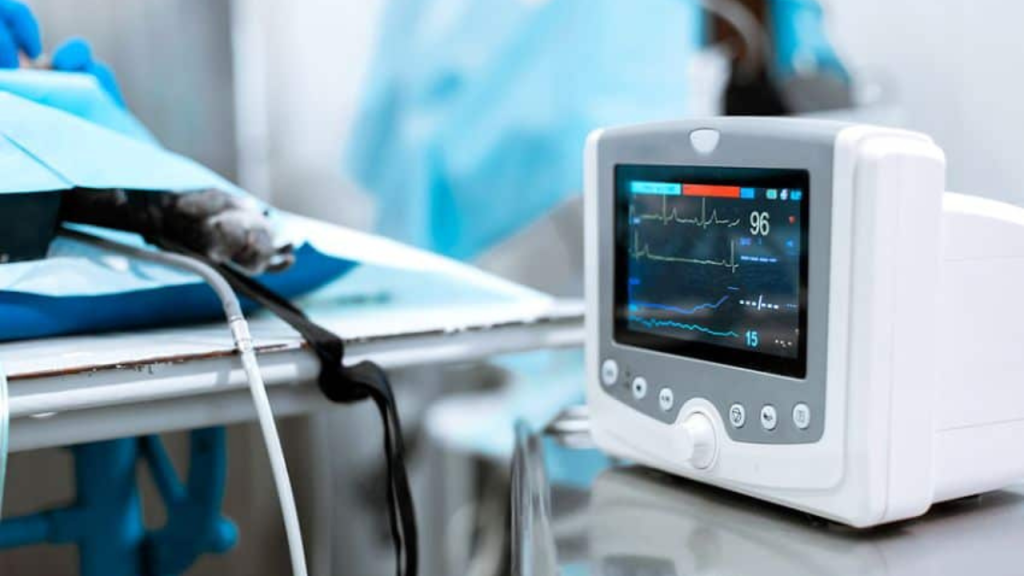
These are the advanced technology used in Cardiology Departments:
1. Cardiac Catheterization Equipment
This technology uses specialized catheters to access the heart’s chambers and vessels. It allows for real-time imaging and intervention, making it essential for diagnosing and treating various cardiac conditions.
Key Features:-
- Fluoroscopy for live imaging
- Contrast agents to visualize blood flow
- Catheters with advanced sensors
- Ability to perform interventions like angioplasty
- Minimally invasive approach
2. Echocardiography Machines
Echocardiography machines utilize ultrasound technology to produce detailed images of the heart’s structure and function. This non-invasive method is crucial for diagnosing heart diseases and monitoring heart health.
Key Features:-
- Real-time imaging of heart valves and chambers
- Doppler ultrasound for assessing blood flow
- Portable options for bedside imaging
- 3D echocardiography capabilities
- User-friendly interface for quick assessments
3. Electrophysiology Mapping Systems
These systems precisely map the heart’s electrical activity, helping electrophysiologists diagnose and treat arrhythmias. They enhance the accuracy of catheter-based procedures.
Key Features:-
- High-resolution electrical mapping
- Integration with catheter navigation systems
- Real-time visualization of arrhythmias
- Ability to create detailed 3D heart models
- Automated data collection for improved outcomes
Read More: Difference Between OPD And IPD: Comprehensive Guide
4. Cardiac MRI Machines
Cardiac MRI (Magnetic Resonance Imaging) machines use powerful magnets and radio waves to create detailed images of the heart’s anatomy and function. This technology is essential for evaluating complex heart conditions.
Key Features:-
- Non-invasive and radiation-free imaging
- High-resolution images of heart tissues
- Assessment of blood flow and heart function
- Capability to evaluate myocardial viability
- Advanced software for image analysis
5. CT Coronary Angiography Systems
CT coronary angiography uses advanced CT scanning technology to visualize the coronary arteries. It provides a non-invasive alternative to traditional angiography for diagnosing coronary artery disease.
Key Features:-
- High-speed scanning for reduced motion artifacts
- Advanced image reconstruction algorithms
- Use of low-dose radiation protocols
- Detailed visualization of coronary arteries
- Ability to assess plaque and blockages
6. Remote Patient Monitoring Devices
These devices enable continuous monitoring of patients’ heart health from home. They collect vital data and transmit it to healthcare providers for ongoing assessment, improving patient engagement and outcomes.
Key Features:-
- Wearable heart monitors (e.g., smartwatches)
- Mobile applications for real-time data tracking
- Alerts for abnormal heart rhythms
- Telemedicine integration for remote consultations
- Patient-friendly design for ease of use
7. Artificial Intelligence (AI) in Cardiology
AI technology is increasingly used in cardiology for data analysis, predictive modeling, and enhancing diagnostic accuracy. AI algorithms assist in identifying patterns that may be overlooked by human analysis.
Key Features:-
- Machine learning for risk assessment
- AI-enhanced imaging analysis
- Predictive analytics for patient outcomes
- Workflow optimization in clinical settings
- Support for clinical decision-making
8. Wearable Cardiac Devices
Wearable cardiac devices, such as Holter monitors and smartwatches, track heart rhythms and other vital signs continuously. They are invaluable for monitoring patients with arrhythmias or heart failure.
Key Features:-
- Continuous heart rate monitoring
- Alerts for irregular heartbeats
- Data storage for long-term analysis
- Integration with mobile health applications
- User-friendly interfaces for patient engagement
Also Read: Book Free Ambulance Service in Delhi
9. Robotic-Assisted Cardiac Surgery Systems
Robotic-assisted systems enhance precision in cardiac surgery, allowing surgeons to perform complex procedures through small incisions. This technology improves recovery times and reduces complications.
Key Features:-
- High-definition 3D visualization
- Enhanced agility and precision
- Minimally invasive surgical options
- Reduced postoperative pain and scarring
- Integration with advanced surgical techniques
10. Advanced Pacemakers and ICDs
Next-generation pacemakers and implantable cardioverter-defibrillators (ICDs) are designed with advanced algorithms that can adapt to patients’ heart rhythms, providing personalized therapy and remote monitoring capabilities.
Key Features:-
- Remote patient monitoring and data transmission
- Adaptive algorithms for real-time adjustments
- Smaller, more efficient designs
- Improved battery life and longevity
- Integration with mobile health technologies
Importance of Cardiology Department in a Hospital
These are the key importance of the Cardiology Department in a Hospital:
1. Early Diagnosis of Heart Conditions
The cardiology department plays a crucial role in the early detection of heart diseases, which can significantly improve treatment outcomes. Early diagnosis allows for timely interventions, reducing the risk of complications and enhancing patient survival rates.
2. Comprehensive Patient Care
Cardiology departments provide holistic care for patients with heart conditions, addressing both physical and emotional needs. They integrate diagnostic tests, treatments, and lifestyle counseling to ensure comprehensive management of cardiovascular health.
3. Access to Advanced Technologies
Hospitals with a dedicated cardiology department are equipped with state-of-the-art technology for diagnosing and treating heart diseases. This access allows for more accurate assessments and minimally invasive treatments, improving overall patient experiences and outcomes.
4. Specialized Medical Expertise
The presence of trained cardiologists and specialized staff ensures that patients receive expert care tailored to their specific heart conditions. This specialization enhances the quality of diagnosis, treatment planning, and follow-up care.
Also Read: How Much Oxygen Does a Human Need
5. Management of Chronic Conditions
Cardiology departments effectively manage chronic cardiovascular diseases such as hypertension and heart failure. Regular monitoring and tailored treatment plans help patients maintain better health and prevent disease progression.
6. Preventive Care and Education
The cardiology department emphasizes preventive care through education on heart health, lifestyle changes, and risk factor management. This proactive approach helps patients make informed choices, reducing the incidence of heart disease.
7. Multidisciplinary Collaboration
Cardiology departments work closely with other medical specialties to provide comprehensive care. This multidisciplinary collaboration enhances treatment plans, particularly for patients with comorbid conditions, ensuring holistic health management.
8. Emergency Care for Cardiac Events
Hospitals with a cardiology department are equipped to handle emergencies like heart attacks. Quick access to specialized care can be lifesaving, significantly improving survival rates during critical events.
9. Research and Innovation
Cardiology departments are often involved in clinical research and trials, contributing to advancements in cardiovascular medicine. This focus on innovation helps develop new treatments and technologies, benefiting future patients.
10. Patient Rehabilitation Programs
Many cardiology departments offer rehabilitation programs for patients recovering from heart surgery or cardiac events. These programs focus on physical recovery, education, and lifestyle modifications, supporting long-term heart health.
Also Read: What are the rules and Regulations of ambulance in India?
11. Continuous Monitoring and Follow-Up
Ongoing monitoring and follow-up care provided by the cardiology department are essential for managing patients with heart conditions. Regular check-ups help track progress, adjust treatments, and address any emerging issues promptly.
12. Psychosocial Support
The cardiology department recognizes the emotional impact of heart disease on patients and their families. Providing psychosocial support and counseling helps address anxiety, depression, and other mental health concerns associated with cardiac conditions.
13. Health Promotion Campaigns
Cardiology departments often engage in community outreach and health promotion campaigns, raising awareness about heart disease risk factors and prevention. These initiatives contribute to healthier populations and reduced incidence of cardiovascular diseases.
14. Integration of Telemedicine
The incorporation of telemedicine in cardiology departments enhances access to care, allowing patients to consult specialists remotely. This innovation improves convenience, especially for those in remote areas or with mobility challenges.
15. Patient-Centric Approach
A strong emphasis on patient-centered care in cardiology departments ensures that treatment plans are tailored to individual needs and preferences. This approach fosters better patient engagement, satisfaction, and adherence to treatment protocols.
Book Ambulance: GoAid Ambulance Service
Best Hospital for Cardiology Department in India
These are the best hospitals in India which consist of the best cardiology departments in India:
| S.NO. | Hospital for Cardiology Department in India | Description |
| 1. | All India Institute of Medical Sciences (AIIMS), New Delhi | AIIMS is renowned for its advanced cardiology department, offering comprehensive cardiac care. The hospital boasts highly skilled cardiology doctors and state-of-the-art technology, making it a top choice for patients seeking specialized heart cardiology treatment. |
| 2. | Fortis Escorts Heart Institute, New Delhi – Best Hospital for Cardiology | Fortis Escorts is one of the premier hospitals for cardiology in India, featuring a dedicated cardiology department staffed by expert cardiologists. The hospital specializes in advanced procedures and has a reputation for excellence in cardiac care. |
| 3. | Apollo Hospitals, Chennai – Top Hospital for Cardiology | Apollo Hospitals has a well-established cardiology department, that provides cutting-edge treatments and technologies. Their team of cardiology doctors is highly experienced, making Apollo a leading hospital for cardiology in the region. |
| 4. | Tata Memorial Hospital, Mumbai – Best Hospital for Cardiology | Tata Memorial Hospital offers specialized care in cardiology and is known for its research and innovation. The cardiology department features expert cardiologists dedicated to treating complex cardiac conditions and providing comprehensive care. |
| 5. | Manipal Hospital, Bangalore – – Affordable Hospital for Cardiology | Manipal Hospital is recognized for its advanced cardiology department, offering a wide range of services. The hospital employs top cardiology doctors who utilize the latest technologies to provide exceptional cardiac care. |
| 6. | Narayana Health, Bangalore – Best Hospital for Cardiology | Narayana Health is a leading hospital for cardiology that provides affordable and high-quality cardiac care. Their cardiology department is equipped with the latest advancements in heart cardiology, ensuring effective treatment for various cardiovascular conditions. |
| 7. | Medanta – The Medicity, Gurgaon – Best Hospital for Cardiology | Medanta features a highly specialized cardiology department, with a team of experienced cardiologists. The hospital is known for its comprehensive cardiac care, including preventive measures and advanced treatment options in what is cardiology. |
| 8. | Kokilaben Dhirubhai Ambani Hospital, Mumbai – Hospital for Cardiology | This hospital offers a robust cardiology department that focuses on both diagnostic and therapeutic services. The expert cardiology doctors at Kokilaben Hospital are equipped to handle complex heart cases, providing exceptional patient care. |
| 9. | PGIMER, Chandigarh – Best Hospital for Cardiology | The Postgraduate Institute of Medical Education and Research (PGIMER) has a well-respected cardiology department. Known for its research contributions, PGIMER offers specialized cardiac services and access to highly skilled cardiology doctors. |
| 10. | Sankara Nethralaya, Chennai – Best Hospital for Cardiology | Although primarily an eye hospital, Sankara Nethralaya has a strong cardiology department that specializes in cardiac health related to ocular conditions. They provide integrated care with cardiology doctors skilled in both fields. |
Also Read: The History of Ambulance Service: Evolution from Past to Future
Conclusion to the Cardiology Department in a Hospital
In conclusion, we have provided you with all the details about cardiology, including the roles and functions of the cardiology department in a hospital. Understanding what is cardiology and the importance of seeing a qualified cardiology doctor is crucial for managing heart health.
We explored the various types of services available within a hospital for cardiology, as well as the significance of advanced technology in diagnosing and treating heart conditions. If you have any questions regarding the cardiology department in a hospital or need more information about heart cardiology, feel free to ask in the comment box!
Cardiology is a specialized field of medicine focused on diagnosing and treating heart-related conditions. It encompasses various aspects of heart health, including prevention, intervention, and management of cardiovascular diseases.
A cardiology doctor, or cardiologist, specializes in diagnosing and treating heart diseases. They conduct evaluations, recommend treatments, and provide ongoing care to manage patients’ cardiovascular health.
The cardiology department typically offers diagnostic tests, invasive and non-invasive treatments, preventive care, and rehabilitation programs, all aimed at managing heart conditions effectively.
You should consider seeing a cardiology doctor if you experience symptoms such as chest pain, shortness of breath, and irregular heartbeats, or if you have risk factors like high blood pressure or a family history of heart disease.
The cardiology department is crucial for the early diagnosis and management of heart diseases. It provides specialized care, access to advanced technology, and a multidiscplinary approach to treatment.
Common tests include electrocardiograms (ECGs), echocardiograms, stress tests, and cardiac catheterizations. These help diagnose conditions and guide treatment plans within the hospital cardiology department.
Invasive treatments involve procedures like catheterizations or surgeries that require instruments to be inserted into the body, while non-invasive treatments include lifestyle changes and medications that do not require surgical intervention.
Not all hospitals have a dedicated cardiology department. ItŌĆÖs essential to choose a hospital for cardiology that is equipped with specialized staff and advanced technology for heart care.
During your first visit, the cardiology doctor will review your medical history, perform a physical examination, and may recommend diagnostic tests to assess your heart health.
To maintain good heart health, adopt a balanced diet, engage in regular physical activity, manage stress, avoid smoking, and have regular check-ups with your cardiology doctor for monitoring and preventive care.
